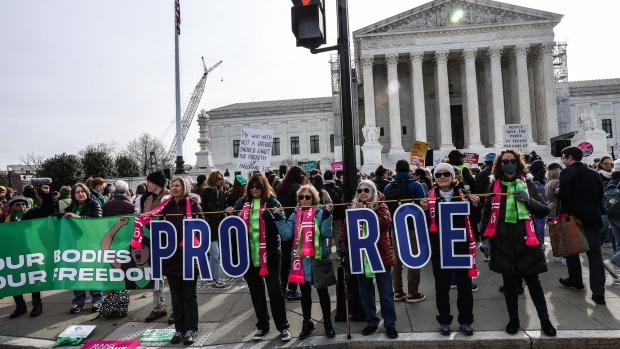Mar 26, 2024
Supreme Court Suggests It Will Back Access to Abortion Pill
, Bloomberg News

(Bloomberg) -- The US Supreme Court signaled it’s likely to preserve full access to a widely used abortion pill as the justices heard arguments in a case carrying major stakes for reproductive rights and potentially this year’s elections.
Taking up the divisive issue for the first time since overturning the landmark Roe v. Wade decision in 2022, key justices on Tuesday voiced wariness about a legal attack on mifepristone, a drug now used in more than half the nation’s abortions.
The suit by anti-abortion doctors would roll back Food and Drug Administration steps that broadened mifepristone’s availability, including a 2021 decision approving dispensation by mail. The Supreme Court has never before restricted access to an approved drug by overriding the FDA’s conclusions about safety.
Conservative Justice Neil Gorsuch questioned whether a suit by a “handful of individuals who have asserted a conscience objection” was grounds for a federal court to topple the FDA changes nationwide.
“This case seems like a prime example of turning what could be a small lawsuit into a nationwide legislative assembly on an FDA rule or any other federal government action,” he said.
The justices are reviewing a federal appeals court ruling that would void steps taken by the FDA since 2016, including its 2021 decision to permanently jettison the requirement that patients physically visit a medical provider. The appeals court said the FDA gave short shrift to safety concerns.
Gorsuch joined justices from across the ideological spectrum in expressing doubt that the doctors and organizations had “standing” to try to overturn the FDA changes. Lawyers for the doctors say they have the legal right to sue because they inevitably will have to treat women who are harmed by mifepristone and need emergency care.
“What they’re asking for here is that in order to prevent them from possibly ever having to do these kinds of procedures, everyone else should be prevented from getting access to this medication,” Justice Ketanji Brown Jackson told the lawyer representing the abortion opponents. “Why isn’t that plainly overbroad scope of the remedy the end of this case?”
The case pits the Biden administration against Alliance Defending Freedom, a Christian legal group that helped drive the effort to overturn Roe.
US Solicitor General Elizabeth Prelogar, the administration’s top courtroom lawyer, said the doctors can’t sue because they failed to show they were injured by the FDA’s actions. She said federal law lets doctors choose not to take part in procedures that would violate their consciences.
Justice Brett Kavanaugh indicated that was a key point for him. “Just to confirm on the standing issue, under federal law, no doctors can be forced against their consciences to perform or assist in an abortion, correct?” he asked Prelogar in what proved to be his only question of the session. Prelogar said she agreed with Kavanaugh.
Justice Samuel Alito was more skeptical. “Shouldn’t somebody be able to challenge that in court?” he asked Prelogar. Alito also questioned whether the FDA fully considered and explained the risks of the changes it made to the rules for mifepristone.
The Alliance Defending Freedom lawyer, Erin Hawley, said the FDA acknowledged that emergency room visits would increase once the in-person dispensation requirement was lifted. She said doctors were being forced “to choose between helping a woman with a life-threatening condition and violating their conscience.”
The drug’s manufacturer, Danco Laboratories LLC, is defending mifepristone alongside the Biden administration. Danco’s lawyer, Jessica Ellsworth, told the justices the challengers were making a “highly attenuated claim that an unknown doctor could be called someday to an unknown emergency room after a series of decisions by third parties.”
Dobbs Fallout
The case is one of two abortion clashes the court will hear in the next month, along with an Idaho case testing whether states can enforce near-total bans even when an emergency room doctor believes ending a pregnancy would preserve the mother’s health. The court is scheduled to rule in both cases by the end of June.
The court’s 2022 Dobbs v. Jackson ruling transformed the legal and political landscape. It cleared the way for tougher restrictions or bans on the procedure in Republican-led states and gave Democrats a potent political issue as abortion-rights advocates battle to prevent access from eroding further.
The mifepristone lawsuit originally sought to have the drug pulled from the market. The opponents filed the case in Texas before US District Judge Matthew Kacsmaryk, a Donald Trump appointee who has written critically about Roe v. Wade.
Kacsmaryk then invalidated the FDA’s 2000 approval of mifepristone. The 5th US Circuit Court of Appeals scaled back Kacsmaryk’s ruling but left intact the part striking down the post-2016 changes.
The Supreme Court last year ordered mifepristone kept fully available while the justices considered the case. Alito and Justice Clarence Thomas dissented, saying they would have let the restrictions go into effect.
The cases are Food and Drug Administration v. Alliance for Hippocratic Medicine, 23-235, and Danco v. Alliance for Hippocratic Medicine, 23-236.
--With assistance from Madlin Mekelburg and Fiona Rutherford.
(Updates with comments from Kavanaugh, Alito starting in 11th paragraph.)
©2024 Bloomberg L.P.







